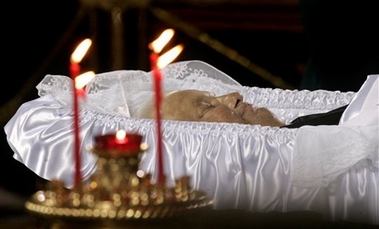俄国前总统叶利钦哀悼会
MOSCOW - Thousands of somber, teary-eyed mourners shuffled past the open casket of Boris Yeltsin in a vast cathedral Tuesday, lighting candles and laying flowers as Orthodox priests chanted prayers for the first freely elected president of Russia.
|
Among other ex-world leaders from Yeltsin's era expected at the funeral were former Polish President Lech Walesa and former British Prime Minister John Major, although some countries such as Egypt and Japan were being represented only by their ambassadors to Moscow.
Yeltsin died Monday of heart failure at age 76.
Russians lined up under overcast skies to pass through metal detectors to enter Christ the Savior Cathedral on the banks of the Moscow River.
Inside, white-robed Orthodox priests chanted prayers and circled the casket through clouds of incense. Yeltsin's widow, Naina, and his two daughters sat dressed in black alongside the coffin, which was draped in the Russian tricolor in the center of the cathedral's nave. An honor guard stood nearby.
Officials estimated that about 4,000 people had paid their respects by early evening.
"I followed Yeltsin as soon as he appeared, I followed him everywhere. ... He was the first honest and decent president," said Taisiya Shlyonova, 75. The mourners were mostly middle-aged or older.
The Soviet Union was an atheist state, so it seemed fitting Russia's first post-Soviet president was accorded religious rites. Although he made appearances at church services, Yeltsin was not regarded as an overtly pious man. Nevertheless, the Russian Orthodox Church was grateful for his support.
The gold-domed Christ the Savior Cathedral is a replica of the church that was blown up by Soviet authorities in 1931 - one of many destroyed under dictator Josef Stalin. It was rebuilt under Yeltsin.
"By his strength, he helped the restoration of the proper role of the Russian Orthodox Church in the life of the country and its people," church spokesman Metropolitan Kirill said in a statement.
Yeltsin's burial will also break with Soviet traditions. Unlike most of the leaders of the USSR, he will not be interred in the cold formality of the burial ground at the Kremlin wall; instead, his grave will be in Novodevichy Cemetery, a leafy and comforting expanse next to Moscow's most famous monastery.
Among those buried there are writers Anton Chekhov and Mikhail Bulgakov and composer Sergei Prokofiev. It is also the resting place of Soviet leader Nikita Khrushchev - a maverick with simple tastes and often crude manners, like Yeltsin.
Both Khrushchev and Yeltsin brought fresh air into the stifling atmosphere of monolithic Communism. Both leaders raised hopes for Russia's development. Both ended their careers carrying the faint odor of disgrace.
Yeltsin is widely remembered for his bold and principled stand against the 1991 attempted coup and for launching Russia on the path to political pluralism, if not a full-fledged democracy.
But he disappointed Russians for failing to bring political, economic and social stability. Many were outraged, as well, by his sale of the nation's industrial might and natural resources in shadowy auctions, for the disintegration of the public health care system and for pensions that turned to cinders in the fires of raging inflation.





 手机网站
手机网站